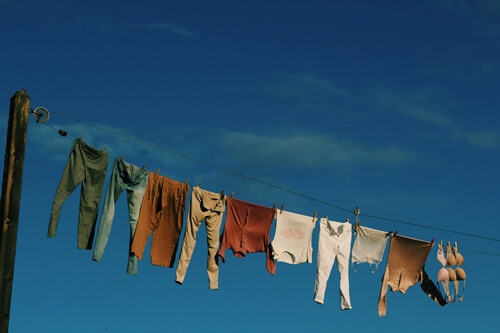Whether you’re sick of wet clothing festooned around your home or concerned about condensation and air quality, or the cost of running a tumble dryer, we’ve got some tips for you!
When should I use my tumble dryer?
You can reduce your bills if you only use your tumble dryer when you need your clothes dried in a hurry, or for a long stretch of rainy days when nothing seems to be drying. We’ve got some more tips in this post on how you can save cash by reducing your dependence on a dryer.
Sort your washing for more efficient tumble drying: heavy garments take longer to dry than lighter ones, so it makes sense to split the load into heavy clothing like jeans and bulky rugby shirts; and light, fast-drying garments like school shirts and synthetics.
Note that some clothing can’t go in a tumble dryer: always check the garment care label for washing instructions. Ariel has some handy information on decoding the symbols on clothing care labels.
When should I line dry my laundry?
On a good drying day, line drying your clothes is quick and free and does not harm the environment (unless your neighbours are particularly offended by the sight of underwear). A good drying day is warm and bright with a brisk wind – your clothes will be dry almost before you know it.
Not everyone has the luxury of an outdoor space where they can dry clothing, though.
When should I dry clothes indoors?
Drying clothes indoors is cheaper and better for the environment than using a tumble dryer, but it takes up space and it can make your home prone to mould.
A heated airer dries clothes relatively quickly, and it is cheaper than running a tumble dryer, so this is one appliance switch that could save you money and energy. Many models of heated airer have time switches and adjustable heat settings, which you can use to your advantage. Some heated airers have a cover which improves efficiency.
A non-heated airer will still dry your clothes, but it may take a while.
Placing an airer near a window for ventilation will speed the drying time. It may also help to put the airer near a source of heat – but take care not to block vents.
Some people swear by using a dehumidifier in the same room as a washing airer. Dehumidifiers are cheap to run and have become much smaller and quieter in recent years.
How much space do you need for drying clothes?
Clothes drying can take up quite a bit of space in your home. There are a number of clever solutions to this, such as airers that you can winch up to the ceiling. But if you’re really short of space for drying clothes, consider decluttering to make room. Putting unwanted and unused domestic items into storage will allow you to make better use of the space in your home. When you store domestic goods, most storage companies will require you to insure your stored goods and they may add the premium to your storage bill. But you might save money with a more competitive insurer. So get a quote from Store and Insure to check you’re not overpaying for your self-storage insurance.





